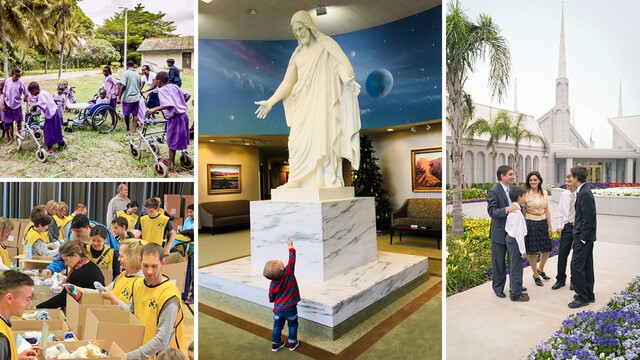The Church released answers to frequently asked questions concerning its finances on Tuesday, including how tithing funds are used and the measures that are in place to ensure the correct use of tithing. To further aid members with their questions concerning the Church's finances, Presiding Bishop Gérald Caussé published a companion article to his remarks at the 2018 Church History Symposium, “Financing Faith: The Intersection of Business and Religion.”
Read on to find the answers to five frequently asked questions about the Church's finances.
Q: How does the Church use tithes and other funds? Why does the Church need financial resources?
The Church of Jesus Christ of Latter-day Saints was established to preach the gospel of Jesus Christ and invite all to follow Him. This is a broad, worldwide work that requires considerable resources. The Church supports more than 30,000 congregations and maintains thousands of chapels and meetinghouses; it operates employment centers, storehouses, family history centers, seminaries and institutes, schools, universities and other higher education initiatives, and 159 temples around the world (with another 30 announced or under construction). The Church oversees approximately 70,000 missionaries in hundreds of proselytizing, service and humanitarian missions. This work continues to grow, often in areas with significant temporal needs. To accomplish this work, the Church follows the financial principles it teaches: living within a budget, avoiding debt and saving and investing for the future.
Q: Is the Church a rich church?
Some people occasionally describe the Church as a prosperous organization. However, the strength of the Church cannot be measured by its financial holdings or real estate assets. As President Gordon B. Hinckley said, “When all is said and done, the only real wealth of the Church is in the faith of its people” (“The State of the Church,” 54). The relative current prosperity of the Church only reflects the faith of its members in observing the law of tithing and other guiding principles such as provident living and self-reliance. It is based on the Lord’s promise that “inasmuch as ye shall keep my commandments ye shall prosper in the land.” This promise appears in 18 verses of the Book of Mormon, and Latter-day Saints believe it continues to apply today.
Additionally, some people may try to attach a monetary value to the Church in the same way they would assess the assets of a commercial corporation. Such comparisons simply do not hold up. For instance, a corporation’s branch offices or retail outlets have to be financially justified as a source of profit. But every time the Church builds a place of worship, the building becomes a consumer of assets and a financial obligation that has to be met through worldwide member donations. The ongoing maintenance and upkeep, utilities and use of the building can only be achieved as long as faithful members continue to support the Church.
Q: Does the Church pay taxes?
The Church of Jesus Christ of Latter-day Saints pays all taxes that are required by law. Latter-day Saints believe in “obeying, honoring, and sustaining the law” (Articles of Faith 1:12). Worldwide, the Church and its affiliated entities pay applicable taxes and other governmental levies. In the United States, where churches and other nonprofit organizations are generally exempt from federal and state income tax, the Church pays taxes on any income it derives from revenue-producing activities that are regularly carried on and are not substantially related to its tax-exempt purposes. Church-affiliated entities that are organized as for-profit corporations pay regular federal and state corporate income taxes on their net income. The Church and its affiliated entities also pay property taxes on property that is not used for religious, educational or charitable purposes, including taxes on undeveloped land and properties held for investment or commercial purposes. Government fees, levies and assessments are paid in connection with the development of Church property. The Church also pays federal and state employer taxes and withholds and remits employee payroll taxes. Where applicable, the Church and its affiliated entities pay state and local sales and use taxes.
Q: What controls are in place to prevent the misuse of funds?
Church leadership is very aware of the sacred nature of Church resources and takes great care to ensure that tithes and other funds are used prudently and are protected from misuse. Any person found misusing sacred tithes or other donations is subject to Church discipline.
The expenditure of Church funds is approved by the First Presidency, the Quorum of the Twelve Apostles and the Presiding Bishopric. These senior leaders counsel together and make decisions to allocate funds. Additionally, certified professionals perform regular audits to ensure strict adherence to standard accounting principles and Church policies. Auditors are also called locally to perform periodic audits in wards and branches following detailed guidelines and processes provided by the Church.
Q: Does the Church have investment reserves? What kinds of investments does the Church possess?
The Church maintains diversified reserves — including common stocks and bonds, interests in taxable businesses, commercial and residential real estate and agricultural properties — to provide financial support for the Church’s ongoing and future operations. These funds are invested solely to support the Church’s mission to preach the gospel to all nations and prepare for the Lord’s Second Coming. Some Church investments, such as agricultural interests, preserve and enhance Church resources but may also be deployed to meet acute needs.
Click hereto read all of the answers about the finances released by the Church.

